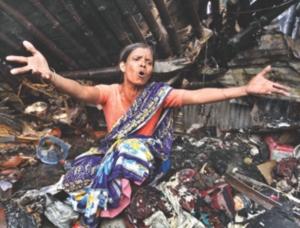| Home - Back Issues - The Team - Contact Us |
 |
| Volume 11 |Issue| 15 | April 13, 2012 | |
|
|
Impressions The Scowling Eagle Glides Down ... Shah Husain Imam
Last Thursday the backlash of the Korail slum eviction and protests against the alleged persecution of minority households in Satkhira jammed the city's arterial thoroughfares for seven hours. Untangling the mess – purely in a relative sense – took another three hours. For a good 10 hours the city for the most part stopped ticking. This ordeal was more excruciating for the travelling public than the usual insufferable traffic they have to negotiate on a daily basis. The fallout to the slum bulldozing operation, divorced as usual from any link to a relocation or rehabilitation plan, ended on a last-minute assurance from the authorities that they would look into the grievances of the affected. An equally belated assurance from the home ministry made the agitating Dhaka University students relent on their protests against the Satkhira incident. Why were the assurances not given on time to save all the trouble for the office-goers, traders, school-going children and their parents, the elderly and those seeking medical care? Perhaps, it has to do with a slow-acting cognitive faculty as to risk perception or sense of danger on the part of law enforcers. Unless a situation aggravates dangerously before their own eyes and a security concern arises, they do not pull up their socks to deter it. And then they make a mess of it. Taking timely decision is accepting responsibility for an action which nobody seems prepared to do along the hierarchy. The foot soldiers are left to their own devices. Thus, quite clearly in most cases we are not mostly proactive, rather reactive to an unfolding situation. We only act when the damage has been done – that is the tragedy of the unwise street policing topped off by looking over the shoulder as to which political party element may be hurt if they were to act professionally. Mob control techniques backed by intelligence gathering and timely persuasive interventions are sorely lacking in law enforcement. They do not even exist in the manuals – of British vintage alien rule. Thankfully, Thursday's episode passed without the customary car bashing or property vandalising spree except for one vehicle that came under attack. But this is one-off because centring around a small tiff over sitting on a chair at Nilkhet triggered a series of clashes between two groups of students in and around New Market only the other day. Such an instance can be easily multiplied. The vehicles caught up in the whirlwind were damaged as they frequently are when they get stranded on both sides to a trenchant flashpoint. The panicked passengers of the vehicles, public or private, often feel they have got a new lease of life on escaping the onslaught. To add to our misery, traffic jams are increasingly being marked by a high incidence of mugging. One would have thought the back-to-back traffic would discourage snatchers as they are vulnerable to being quickly apprehended. In actual fact, they make a field day of sardine-packed-vehicular jam: Information gathered from such sources as victims, police, hospital and local people revealed that 200 snatching incidents had taken place from March 1 to April 7. One hundred and twenty persons were hospitalised. According to DMP statistics, 21 cases are being tried in speedy trial court under 41 police stations. While on paper, the police claim that the situation is under control, the fragility of it all was poignantly underscored by Hazrat Ali, 40, near Mirpur Zoo last week as he lost his life while trying to rescue three ladies who were being mugged by a few gun wielding thugs. No law enforcement authority worth its salt can rely on individual acts of bravery to combat mugging perpetrated by armed gangs. As many as 40 mugging rackets are operating at any given time (as gleaned from a Prothom Alo report). Motor cycles are menacing whichever way you look at them. In the hands of muggers they are a convenient mode for disappearing without a trace. Even otherwise their ubiquitous piercing through narrow spaces in the streets and along the pavements, the latter in defiance of a court order should be sternly dealt with. On the whole, however, there is a contradiction in public behaviourial pattern. On the one hand, their tempers go ballistic at the slightest provocation or on hearing a rumour whose veracity they will never care to ascertain; on the other, they will endure pain quietly as if resigned to it like fatalists with no power to change things around. As a result, no public resistance builds up against any civic criminality or denial of rights, a sad commentary that on our urban culture which is clearly under-developed. We may have had urban expansion but it is with a gaping deficit in urbanity. The writer is Associate Editor, The Daily Star.
|
||||
|
